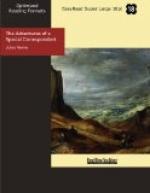“I see,” said I, “we must take China as it is.”
“And as it will probably always be, Monsieur Bombarnac. Ah! if you knew how easy the life is—an adorable dolce far niente between folding screens in the quietude of the yamens. The cares of business trouble us little; the cares of politics trouble us less. Think! Since Fou Hi, the first emperor in 2950, a contemporary of Noah, we are in the twenty-third dynasty. Now it is Manchoo; what it is to be next what matters? Either we have a government or we have not; and which of its sons Heaven has chosen for the happiness of four hundred million subjects we hardly know, and we hardly care to know.”
It is evident that the young Celestial is a thousand and ten times wrong, to use the numerative formula; but it is not for me to tell him so.
At dinner Mr. and Mrs. Ephrinell, sitting side by side, hardly exchanged a word. Their intimacy seems to have decreased since they were married. Perhaps they are absorbed in the calculation of their reciprocal interests, which are not yet perfectly amalgamated. Ah! they do not count by moons and watches, these Anglo-Saxons! They are practical, too practical!
We have had a bad night. The sky of purple sulphury tint became stormy toward evening, the atmosphere became stifling, the electrical tension excessive. It meant a “highly successful” storm, to quote Caterna, who assured me he had never seen a better one except perhaps in the second act of Freyschuetz. In truth the train ran through a zone, so to speak, of vivid lightning and rolling thunder, which the echoes of the mountains prolonged indefinitely. I think there must have been several lightning strokes, but the rails acted as conductors, and preserved the cars from injury. It was a fine spectacle, a little alarming, these fires in the sky that the heavy rain could not put out—these continuous discharges from the clouds, in which were mingled the strident whistlings of our locomotive as we passed through the stations of Yanlu, Youn Tcheng, Houlan-Sien and Da-Tsching.
By favor of this troubled night I was able to communicate with Kinko, to take him some provisions and to have a few minutes’ conversation with him.
“Is it the day after to-morrow,” he asked, “that we arrive at Pekin?”
“Yes, the day after to-morrow, if the train is not delayed.”
“Oh, I am not afraid of delays! But when my box is in the railway station at Pekin, I have still to get to the Avenue Cha-Coua—”
“What does it matter, will not the fair Zinca Klork come and call for it?”
“No. I advised her not to do so.”
“And why?”
“Women are so impressionable! She would want to see the van in-which I had come, she would claim the box with such excitement that suspicions would be aroused. In short, she would run the risk of betraying me.”
“You are right, Kinko.”
“Besides, we shall reach the station in the afternoon, very late in the afternoon perhaps, and the unloading of the packages will not take place until next morning—”




